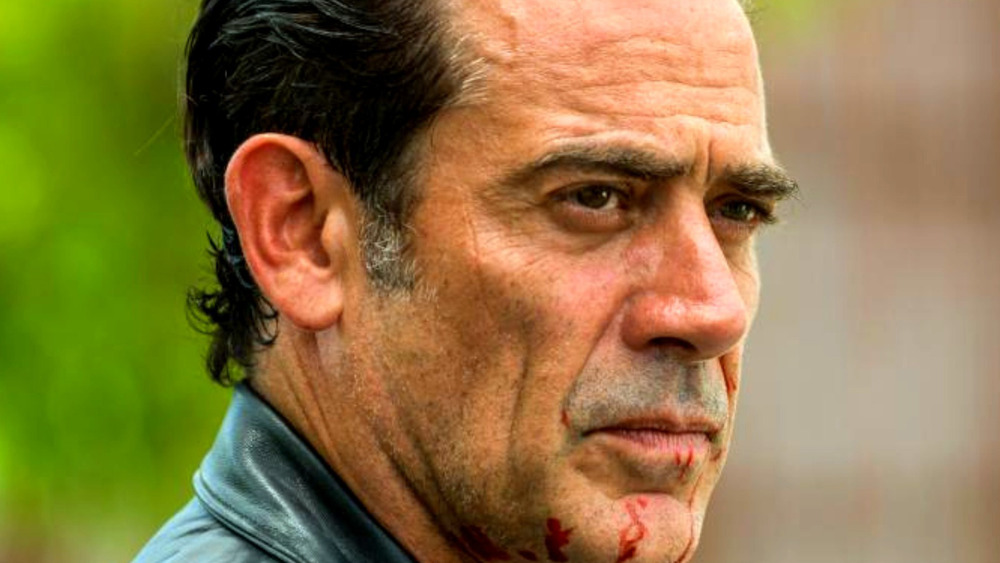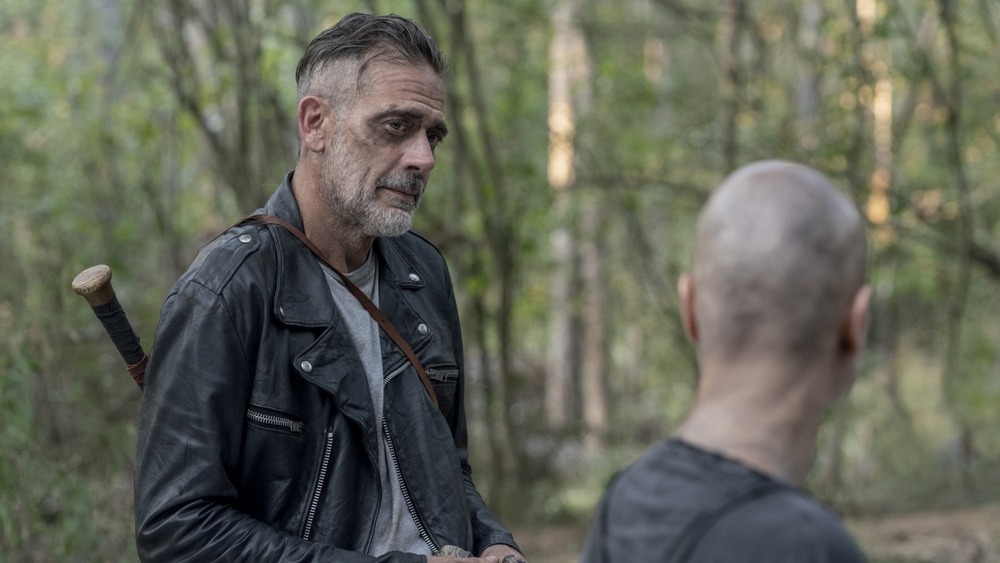The Walking Dead's Negan Episode Confirms What We Suspected All Along
Since Negan (Jeffrey Dean Morgan) made his dramatic first appearance on AMC's The Walking Dead, it has been obvious he's not a good guy. Good guys don't generally introduce themselves by decapitating two fan-favorite characters in gruesome fashion. Sure, Jeffrey Dean Morgan brings a certain rugged charisma to the role, and his scenery-chewing dialogue has long been a series highlight, but underneath it all is a man that has killed out of cruelty, sport, and personal gain. He's also, lest we forget his many wives, a serial coercive rapist. His Sanctuary was a brutal, totalitarian regime governed by a carrot-and-stick system of physical punishment and monetary reward. The whole hierarchy was kept aloft by fear. Before Rick's alliance of survivors took down the Saviors, their society represented the most extreme extension of a system based on the flawed premise that "might makes right." So forgive us if we've always been a little skeptical of the bat-man's "I did it because the apocalypse" rationalization.
As The Walking Dead concludes its drawn-out tenth season, fans have been treated to a dedicated Negan episode that seems to confirm the worst about Negan's character. The cynics among TWD's viewership may have already written Negan off as a violent sociopath, but the latest "bonus" episode of season 10 pretty much confirms for the rest of us that Negan had issues long before the dead started climbing out of their graves and munching on the living. Some people are just wired wrong, and for Negan, the zombie apocalypse served as more of an opportunity for him to indulge his inner psycho, than a trigger.
The episode entitled "Here's Negan," based on a side story from the comics that was published in trade paperback under the same name, takes a look at the character's origin story. The prequel tale reveals what the man was like back when Lucille (played here by Morgan's actual wife, Hilarie Burton) was an actual woman, instead of a baseball bat wrapped in barbed wire. The verdict isn't great for the big guy in the leather jacket. While Negan may still get his shot at ultimate redemption on the show — his character has one of the strangest, most bittersweet endings in the source material, after all — this episode proves that he was never a man to admire.
Negan has always been a violent man
"Here's Negan" shows us a familiar side of Negan in an unfamiliar environment. The former Saviors kingpin had always relied on the paper-thin justification that the post-apocalyptic world of The Walking Dead required a brutal hand to start arranging things into a shape resembling the lines of civilization once again. It's all there in the somewhat ironic name of his group. The Saviors were saving people from zombies and societal collapse — at least, that's what Negan was telling himself and any unfortunate captive who had to listen. Turns out, Negan's anger issues and propensity to resort to violence predate the appearance of the walkers.
In "Here's Negan," the problems all start while he's enjoying a pleasant night out with his wife, Lucille. When a belligerent man at the bar talks over a special song of theirs, Lucille asks the man to lower his voice. The man proceeds to get in her face instead, and at that moment, Negan loses his cool and attacks him. Post scuffle, Negan is fired from his job as a gym teacher (side note: such a perfect job for Negan) at the local school, where the man's kids attend. He is also sued, and Lucille then has to pay for her aggressor's hospital bills, because the beating Negan doled out was so severe.
The scene paints a portrait of how Negan's malicious and vicious ways come from a deep-rooted place in his past. He's always been a little too quick to resort to violence, which many of us already assumed.
Can Negan ever really redeem himself?
One of the open character questions that the series will have to grapple with as it approaches its endgame is whether or not a man like Negan can ever truly redeem himself. We've seen plenty of redemption arcs over the last ten seasons of The Walking Dead. In general, the stressful conditions of the zombie apocalypse allow us to be generous with characters who have done terrible things to survive. Negan's a difficult case, though, just because of the sheer scale of his wrongdoing.
Since his incarceration, Negan has made some pretty bold attempts to prove that he's reformed his ways. First, he refused to escape, even when his cell was left open and unattended. He also formed a bond with Judith (Cailey Fleming), even risking life and limb to save her during one of Alexandria's most dire moments. Then, he played a crucial (if violent) role in helping bring down Alpha's (Samantha Morton) Whisperers, the most virulent threat to the survivors since — well – Negan. Anyone who was starting to come around, however, is going to have to rethink that assessment after watching "Here's Negan."
Potential spoilers here, but in the comics, Negan is one of the few characters who actually survives to the final panel. In the final, flashforward issue that follows an adult Carl Grimes (deceased on the show), we get a brief glimpse of Negan who has been living a lonely life in exile — presumably since the Whisperers arc concluded. The man may have earned his freedom by acting in the interests of the community, but he never fully redeems himself. His isolated life is his ultimate penance for crimes that can never be undone.
We'll have to wait for TWD's final season to see if it takes Negan in a similar direction, but the very fact that the show adapted "Here's Negan" suggests that someone on the creative team wanted to remind us all that Negan's flaws run deep.


